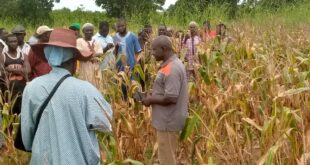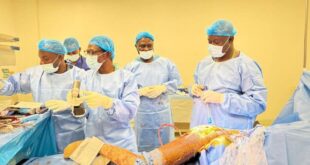Dungu, Ghana – The Pro-Chancellor for the University for Development Studies, (UDS) Professor Seidu Alhassan has called for a national policy directive on Ghana’s shea nut industry.
According to him, there is the need for the government to ensure clear and adequate policy and institutional support for the industry.
Just like the 10-year Cashew Development Plan which was recently launched by government of Ghana, Professor Seidu Alhassan said a similar one should be designed to target the shea sub-sector with a reasonable short to long term plan characterised by an extended financial, distribution, material and technical support toward the production, sale and processing of shea nuts in the country.
He explained further that, a conscious plan for the shea industry even becomes more important to support government’s flagship programme of One-Village-One-Factory intending to build factories that are shea dependent. “Thus, unless a clear development plan for the shea industry is put in place, this policy cannot be achieved” he opined.
Speaking at his 5th Inaugural Lecture on the theme: The Shea Tree, Our Heritage; Sustaining Ghana’s Shea Industry at the Andani Andan Academic Board Chamber at the central administration of UDS, he explained the socio-economic value of the shea tree, how local and foreign entrepreneurs have exploited the tree and more importantly how the present generation will be handing over the tree to future generations.
Available reports show that, the Shea industry in Ghana occupies an important place in the economic development of the country. It is estimated that there are about 9.4 million shea trees in Ghana and these can potentially yield one hundred tonnes of shea nuts worth about $100 million annually. It is also estimated that annual earnings from the sector currently stand at $175 million, comprising export revenues from the raw nuts and processed butter.
Speaking about the challenges facing the shea industry, Professor Seidu Alhassan mentioned the lack of comprehensive data, to a decline in shea tree population, poor quality of shea products and the absence of a clear policy direction for the shea sub-sector. He added that, key stakeholders in the sector do not have access to information.
He argued that, the future of the country’s shea industry lies in the continuous existence of shea trees. He indicated the strong sustainability of the industry highly depends on the extent to which existing trees are protected and new ones planted.
Meanwhile, a number of interventions and innovative ideas have been suggested.
Professor Seidu Alhassan disclosed that, in order to maximize the export potential of shea butter in Ghana and other West African producing countries, policy makers should design policies that will improve on the education and entrepreneurial capability of shea processors.
He noted that improved market access cannot be attained unless business owners have the necessary entrepreneurial skills and education capacity. The education process according to him should include training in improved methods of packaging and marketing.
He also suggested that efforts should be made by civil society organisations and national and international shea networks like the Shea Network Ghana and Global Shea Alliance to sensitize shea processors to become aware of international market standards and promotion.
Source: ClassFMonline.com
Check Also
Le’cole Montisorr Fosters Entrepreneurial Spirit
Tamale, Ghana – Le’cole Montisorr School in Tamale is taking a proactive approach to shaping …
 Savannah News Online Reporting Only What Matters Most
Savannah News Online Reporting Only What Matters Most



